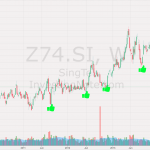
I wrote a post on “the truth why I don’t make losses in investments” to explain how losses can be avoided with a long term active strategy. While that strategy works for some investors, many feel that it is not achievable because they have not made profits at all due to various reasons. In today’s post, I will attempt to explain why sure-win strategies do not exist. Whereas all legitimate techniques will work and fail at times so it heavily depends on the investor’s reflexivity to adjust their strategy accordingly.
Investment strategies requires substantial amount of funds to work
Simply put, you can’t be a successful investor if your capital amount is small. This is because commissions alone will ward off small-time investors who wish to go in and out of the market. (CFD trading is not investing) Hence most experienced investors would understand that the amount invested should be large enough to make sense. In addition, investors must also prepare their capital in tranches to buy and average down or up to adjust the average price of their counters. This means that if an investor only has enough to enter the market with one tranche, for example, $10k, then the only strategy he or she can employ would be a buy and hold strategy. No doubt that investor might buy into a quality company at the right time and make a substantial profit but if it so happens that the price trend downwards, the only 2 options is to hold for dividends until breakeven or sell at a loss. This is one of the few reasons why it takes more than just strategies to make money in your investments.
Investment strategies are based on companies performance but share prices are affected by market forces
Sound strategies are based on the analysis and identification of quality companies. That said, the market is also swayed by market sentiments and such volatility can range from small and insignificant to unprecedented levels. I am pointing this out because many people like to ask if you can surely make money from a particular company since it was doing well and will continue to do well. My response to that would be, “if you expect the share price of that company to only go up, then do not bother”. This is because no counters in the market will rally indefinitely without volatility in both directions. The reason behind such volatility stems from the fact that there will always be people investing for the wrong reasons. By wrong reasons, I mean those who buy simply because others told them to, and hence they will sell once there are rumors or bad news reported about the industry or company. Such cases are common and they often result in price fluctuations which cannot be explained even with proper planning and analysis.
If you are not willing to lose, you simply can’t win on the long run
Some investors have huge war chests and are constantly flaunting about how much capital they can deploy “at the right time.” The truth behind such investors is that they will hardly make substantial profits over time because they are often too slow to deploy their capital that they “miss the boat.” It is understandable that no one wants to make paper losses but there is no real certainty that the time when you deploy your capital is always the “right time.” In other words, though it is important to have substantial amounts of capital, there is no sure win method in investments when you are not willing to make temporal losses.
Closing Thoughts
Investing takes more than just aspirations and hearsay because valuations have already mushroomed decades ago. Thus making it difficult to just buy and hold to make money from owning shares. As investors, we should be equipped with not just resources but also a variety of techniques and the right temperament to become successful. To sum up, there is no real sure win strategy but there is a sure-lose strategy. That sure-lose strategy is to buy different shares and expect all of your counters to appreciate in value over time without a proper understanding of the companies that you invest in or rather betting for. (also known as gambling)






